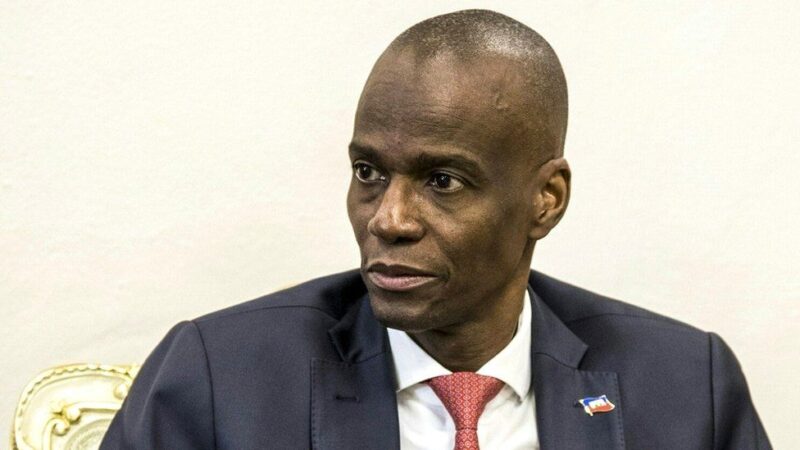The president of Haiti was assassinated on February 7th, 2019. The police officers who were supposed to protect him were also detained. It is suspected that they may have been involved in the assassination and could be planning a coup d’état.
The how was haitian president killed is a question that has been asked by many people. The Haitian Senior Police Officers were detained for their involvement in the assassination of President Jovenel Moïse.
PORT-AU-PRINCE, HAITIAN REPUBLIC— According to Haiti’s National Police Chief Leon Charles, five top officials of the country’s National Police have been arrested in connection with President Jovenel Mose’s murder last week.
Dimitri Hérard, the chief of Mr. Mose’s security detail, is among those arrested. The five policemen have not been charged, according to Mr. Charles, but Mr. Hérard has been questioned.
He also said that more than 20 members of Mr. Mose’s security detail are being questioned. On the night of the murder, some of them were on duty at the president’s house, but Mr. Charles wouldn’t say how many. Police are investigating why the guards at the president’s cul-de-sac house did not seem to put up any opposition to the assailants.
At a news conference, Mr. Charles stated, “Our friends from the FBI and the Colombian delegation were able to ask some questions to some of the bad people that we captured, who we know finished the murder.”
According to Haitian officials, more than 20 former Colombian troops were involved in the July 7 assassination, leading Colombian President Ivan Duque’s government to send a small team to Haiti to provide evidence collected in Colombia to Haitian investigators.
In a Friday interview in Bogotá, Colombian Defense Minister Diego Molano stated that Haitian investigators are attempting to identify “those who participated in that last act.”
Mr. Molano said that the Colombian government thinks that former Colombian soldiers were involved in the assault on the president’s house and, in the case of two of them, were involved in the plotting of his assassination. He did say, though, that they may not have been the only ones.
Following the murder of President Jovenel Mose, Haitian police claimed they killed four suspects and detained two more. His assassination adds to the country’s political instability, which has long been roiled by lawlessness and economic problems. Associated Press photo/Joseph Odelyn
According to Haitian officials, the murder was orchestrated by a group of Miami-based businesspeople and security experts.
Despite the fact that Mr. Hérard has not been named as cooperating with those individuals, Colombian authorities have claimed they are looking into why he traveled to Colombia four times between January and May.
Mr. Molano said that Colombia collaborates with Haitian authorities, who are leading the investigation into Mr. Mose’s death. According to a Haitian investigator, the president was shot 12 times and had an eye gouged out by the murderers. Martine Mose, his wife, was injured in the attack and is being treated at a Miami hospital.
Mr. Molano said, “We hope the investigations establish whether Haitian officers were among those that participated.”
Mr. Mose’s funeral is set on July 23 in the northern port city of Cap-Hatien, according to officials in Haiti’s caretaker government.
Women waited in line at a police station in Port-au-Prince on Thursday for World Food Program distribution of corn-flour bags.
Associated Press photo/Fernando Llano
Officials from Haiti and Colombia claim a group of individuals, including two former Colombian military, gathered in the Dominican Republic and Haiti in recent months to plan the murder.
Since the murder, Haitian authorities have named new suspects nearly every day, with more than 30 people accused of playing a part.
Christian Emmanuel Sanon, a little-known Haitian preacher who authorities believe wanted to be president, was identified as the accused mastermind. He and James Solages, a Haitian-American who authorities claim acted as a translator for the former Colombian troops, were both detained in Haiti. According to police, a former Haitian senator, John Joel Joseph, is wanted for murder, and Walter Veintemilla, a Florida businessman, has been named as a person of interest for allegedly brokering meetings among the plotters. The Haitian investigators have identified CTU, a security firm based in Miami, as the business that allegedly recruited the Colombians.
Subscribe to our newsletter
The tenth point.
Every day, a customized, guided tour of The Wall Street Journal’s greatest scoops and articles.
Mr. Veintemilla’s finance company, Worldwide Capital Lending Group, said in a statement that it helped give a loan to CTU to boost Mr. Sanon’s efforts, but that it was not involved in any murder plan. The others identified by Haitian police could not be contacted for comment immediately, and it was unclear whether they had attorneys.
Eight FBI agents are in Haiti, collaborating with their Haitian colleagues. A Colombian intelligence and police team is also there, and according to Colombia’s police commander, some of the arrested Colombian troops were questioned.
Mr. Molano, Colombia’s defense minister, said that the plan “did not envisage the murder” of Mr. Mose at first, but rather the arrest of him on a fake warrant so that the conspirators could seize power. Colombia’s national police director, Jorge Vargas, stated in a video provided to media that the plot evolved in the three days running up to July 7, with the plan becoming an assassination of the president.
Officials in Colombia claim that two former soldiers, Germán Alejandro Rivera and Duberney Capador, conspired with businesspeople and security personnel. Another five ex-soldiers were also privy to the plot’s specifics. The other former soldiers, who had been recruited in Colombia following military careers, believed they had been engaged only to provide protection.
“However,” Mr. Molano said, “everyone has some degree of responsibility.”
Mr. Vargas claimed that Worldwide Capital had contributed money to help the former Colombian soldiers go to Haiti, with Mr. Rivera receiving the funds so he could organize. Mr. Vargas told reporters that four Colombians arrived in late April and early May, followed by the remainder of the former troops in June.
As the deadline for moving on the president neared, Joseph Felix Badio, a former Haitian justice ministry employee who was allegedly plotting with the gang, informed Messrs. Rivera and Capador, “that what they had to do is kill the president,” according to Mr. Vargas. On Tuesday, Haitian police issued an arrest warrant for Mr. Badio. Mr. Badio was unavailable for comment, and it was unclear if he had retained legal counsel.
Messrs. Rivera and Capador, as well as a third former soldier, were slain in a shootout in the aftermath of the assassination, according to Haitians. Former Colombian military personnel who knew some of the detainees are baffled as to how the two guys accused of planning the murder are still alive.
Matas Gutiérrez, an activist in an organization supporting Colombian veterans and their families, including relatives of those kidnapped in Haiti, stated, “A dead person doesn’t speak.”
The group’s leader, José Espinosa, said he wants to make sure the remains of the three former soldiers are brought to Colombia “so that Colombians and Americans may conduct a forensic examination.” Two of the three Colombians that died are seen face up on the ground, arms outstretched. One of them has a gunshot wound on the side of his body. Another has a swollen and bloody face.
Before their journey to Haiti turned violent, one of the former Colombian soldiers attempted to enlist the help of fellow veterans back home. He emphasized to his pals in mid-June texts delivered to a WhatsApp group conversation that he would never get engaged in anything improper.
He said, “My good name is essential to me.”



